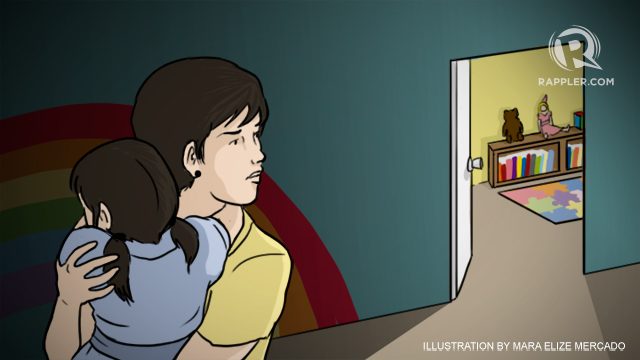SUMMARY
This is AI generated summarization, which may have errors. For context, always refer to the full article.
 Rappler’s Life and Style section runs an advice column by couple Jeremy Baer and clinical psychologist Dr Margarita Holmes. Jeremy has a master’s degree in law from Oxford University. A banker of 37 years who worked in 3 continents, he has been training with Dr Holmes for the last 10 years as co-lecturer and, occasionally, as co-therapist, especially with clients whose financial concerns intrude into their daily lives. Together, they have written two books: Love Triangles: Understanding the Macho-Mistress Mentality and Imported Love: Filipino-Foreign Liaisons.
Rappler’s Life and Style section runs an advice column by couple Jeremy Baer and clinical psychologist Dr Margarita Holmes. Jeremy has a master’s degree in law from Oxford University. A banker of 37 years who worked in 3 continents, he has been training with Dr Holmes for the last 10 years as co-lecturer and, occasionally, as co-therapist, especially with clients whose financial concerns intrude into their daily lives. Together, they have written two books: Love Triangles: Understanding the Macho-Mistress Mentality and Imported Love: Filipino-Foreign Liaisons.
Dear Dr Holmes and Mr Baer,
I don’t know where and who to seek help. I badly need advice so I can perhaps find healing from the tragedy that happened to my child.
Someone molested her at daycare. She was only 3 then. Until now she doesn’t want to talk about it. She didn’t tell me who it is. I pulled her immediately out of there. My complaint was dismissed because I lacked evidence. The witnesses don’t even want to testify, even the doctor – maybe because we are Asian.
My husband wants me to forget about it, keep it a secret to protect her from further shame when she grows up.
I don’t know, but something in me needs justice, though the doctor told me that I might cause further damage to her emotionally by asking her over and over again about it. I still do hope that someday she will remember and together we will seek justice.
I don’t know what to do. All I know is this tragedy will forever haunt me. It breaks my heart every time I remember. I don’t know how to forget it. I’m trying to be strong for her. I almost lost my mind then, but I have to be strong for her.
Please help me. I hope to find healing.
Thanks,
Mommy
——————–
Dear Mommy,
Thank you for your letter.
I wonder if I am alone in feeling a slight unease at what you have told us. The background story – your daughter was abused at daycare when she was 3 years old – is of course a matter of grave concern, but what comes through very clearly is the way in which you present the problem, focusing all the attention not on your daughter but on you.
What do you tell us? You want justice, you don’t know what to do, the tragedy haunts you, it breaks your heart, you can’t forget it, you are losing your mind, you want to find healing.
This seems to indicate that what ought to be a concerted effort to help your daughter through a process of recovery and healing has turned into some sort of vengeful crusade, in pursuit of which the needs of your daughter have become at best secondary.
You have taken on the role of a lone crusader, despite the fact that your husband does not want to pursue the matter, your doctor has warned you that you may harm your daughter more if you keep harping on the subject and your daughter herself does not want to talk about the incident.
Perhaps the time has come for you to consider her best interests ahead of yours. If your own doctor is not a child psychiatrist, then take her to see one. He will be able to determine what treatment, if any, your daughter requires. Expert advice is required in cases such as this. Remember too that there are times when a mother’s maternal instinct is simply insufficient to identify the best way forward and the views of professionals specifically trained for this purpose should prevail.
Independent of this however, you too should seek treatment. You have clearly failed to come to terms with what happened and need to resolve your outstanding issues not only for your own peace of mind but also for the benefit of your daughter and your husband.
Wishing you the best,
Jeremy

Dear Mommy:
I can’t help feeling that in terms of what is best to do, Jeremy is right. But I fear he has been too harsh with you, that while this column is not to be mistaken as therapy, perhaps it can help you understand yourself more so that focusing on your daughter’s well-being will be just as easy as (or far less difficult than) focusing on your own.
While many presume that it is always the child that needs the most treatment, research shows that sometimes it is the mother that does so.
While I don’t know how your daughter is at the moment, or even how old she is, there is a pretty strong sign that she has dealt with the sex abuse more successfully than you have: “Until now she doesn’t wanna talk about it. She didn’t tell me who it is.” Anyone who can stand her ground in the face of what I can imagine was (and still is) your onslaught of rage and what I can imagine must be relentless questioning (starting at 3 years old) has true grit in her.
So it is back to you once more, dearest Mommy.
Research shows that mothers are often blamed for what happened, and this may be part of the problem. Perhaps you sensed that others (no matter how few or many) feel you are partly to blame for what happened and your attempt to get “justice” is one way of making sure you are no longer blamed. Your commitment to find out who the perpetrator is might be an unconscious way to prove that: “See, I didn’t do it. This guy did.”
Here are a few articles you can read online that many have found to be helpful: this one from Springer.com, and this, and, more specifically, this from wcsap.org.
It would be best, of course, to read books on the matter. The three I found most helpful are: Child Sexual Abuse: Its Scope and Our Failure (2002) by Dr. Rebecca Bolen, The Boy Who Was Raised As a Dog, (2007) by child psychiatrist Bruce Perry, and finally, the tried and tested Mothers Surviving Child Sexual Abuse (1992), by Carol-Ann Hooper.
In these books and articles, research consistently supports the view that the best way to help the child is to support the parent especially because it is the parent that is going to be with the child for the long term and can help her most in the recovery process and I feel that there hasn’t been much support for you. Some of it, while not condonable, is understandable: the daycare center probably fears you may sue, doctors fear unnecessary involvement in convoluted court cases. And because you haven’t felt listened to and understood, your desire for “justice” has grown by leaps and bounds.
Dearest mommy, I worry you may be so caught up in what you call justice but your husband describes as vendetta that he will retreat because that is the only way he can deal with you if your desire for justice overwhelms him.
If he does retreat, your daughter will be left with only you and studies consistently show that the more supporters a child has, the better it is for her, the faster she is healed. To quote Dr. Perry, “the more healthy relationships a child has, the more likely he will be to recover from trauma and thrive” (p.230). “Therefore, an essential factor is how to make more than one caregiver responsible for the post disclosure support of the child.”
In a way, you too were traumatized. Perhaps as much as – maybe even more than – your daughter. Maybe you blame yourself for not stopping the abuse (but then, how could you if you didn’t know it was happening if you weren’t even there in the first place?) Maybe you feel traumatized because your daughter didn’t disclose the abuse to you first… the fact of the matter is traumatized people can respond in very different ways—sometimes very illogically. And, what they consider to be appropriately supporting their child and family may be very different than what we think.
Dr Rebecca Bolen herself, who did a meta analysis of studies done on non-offending mothers, shares that one of her reasons is to provide a more balanced perspective in the light of all the mother-blaming that occurs during cases such as yours. The blame may not be direct or verbalized, but it is there.
To paraphrase Dr Bolen, the damage that mother-blaming causes to the parent/child relationship cannot be overstated. The research describes how parents frequently feel overwhelmed, helpless, guilty for not having recognized the abuse, blamed for “allowing it to happen.”
Parents have to do two things: support the child and overcome their own emotional distress. Oftentimes people are quick to judge the parents’ responses, overlooking the fact that a parent’s reaction is a process that occurs over a period of time, not a snapshot of a moment.
We do not have to assume that, for example, because they seem to vacillate between belief and disbelief (a cognitive state over which they have no control), they must therefore be less supportive in their actions (which they can control). It is so important you recognize this, Mommy, as must your husband, friends and people you had to deal with in the past and those you deal with in the present. It is important you recognize this in yourself, so that you can perhaps forgive yourself and move on in your own way.
Is it necessary to forgive yourself and (even) the perpetrator as some professionals suggest? The former, definitely, the latter – perhaps not. Perhaps it would be best to instead focus your energy on accepting what your husband and friends can and are willing to do, even if it is not the path, nor as much as, you would’ve liked. Would that help make your daughter become a wise young woman full of energy and light, looking forward to a bright future instead of constantly backward to that black time in her past? Oh, I definitely think so, don’t you?
Good luck!
Margie
– Rappler.com
Need advice from our Two Pronged duo? Email twopronged@rappler.com with subject heading TWO PRONGED. Unfortunately the volume of correspondence precludes a personal response.
When leaving a message on this page, please be sensitive to the fact that you are responding to a real person in the grip of a real-life dilemma, who wrote to Two Pronged asking for help, and may well view your comments here. Please consider especially how your words or the tone of your message could be perceived by someone in this situation, and be aware that comments which appear to be disruptive or disrespectful to the individual concerned will be removed.
Add a comment
How does this make you feel?
There are no comments yet. Add your comment to start the conversation.